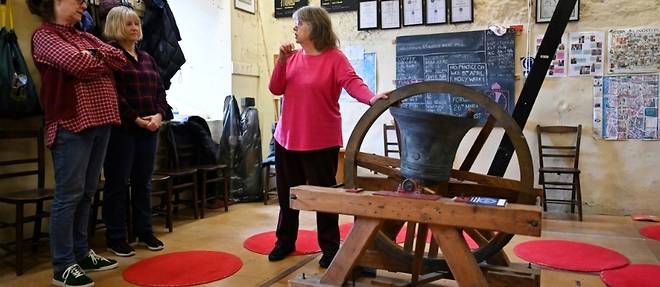At the top of the steep, narrow staircase in the Church of All Saints in Kingston Upon Thames, near London, experienced bell ringers put two new recruits through their paces. They should be ready for the coronation of Charles III in a month.
Charlotte Mafi, a doctor, and Anne Porter, an administrative officer, both answered the call for new volunteers to help "ring the bells for the king" on May 6 across the UK .
But before that, Kate Flavell, secretary of the church bell ringers, reminds the two volunteers of some essential safety rules, and in particular not to accidentally get their feet stuck in the noose at the end of the rope allowing ring the bells.
"Don't walk near the ropes and keep your feet firmly planted on the ground when you're sitting near the ropes," she tells Charlotte Mafi.
According to Kate Flavell, whose husband Paul has run the church bells for 35 years, it takes about 10 hours to learn how to ring a bell correctly.
"You have a heavy piece of metal swinging on a wheel (...) and you control it with a rope. It's not easy and it takes some learning," she says.
"Very soothing"
Along with Charlotte and Anne, 1,000 people responded to the call from the UK's Central Council of Church Bell Ringers for the coronation.
"It's something I've always wanted to do and when I heard (the call) I said to myself + why not now? +", says Charlotte, adding that she finds the rhythm of the bells "very soothing".
After three hours of training, Anne Porter begins to master the gesture.
"I've always loved the sound of bells," she says. "I'm not sure enough of myself yet to manage one myself, but soon I'll be able to join the other ringers," she hopes.
And the story of the Church of All Saints in Kingston Upon Thames resonates with the coronation.
Seven Saxon kings of England are said to have been crowned in an ancient church that previously stood on the site.
Royal events provide the perfect opportunity for Paul and Kate Flavell, who met ringing the bells nearly 40 years ago, to do what they love the most.
"Last year, for the Queen's Platinum Jubilee (celebrating 70 years of reign of Elizabeth II ), we rang (...) 45 minutes without stopping," says Kate. “And of course, not so long after, the queen died” on September 8.
Carrying on the tradition
“Ringers will always ring the bells for royal events. When Prince William and Kate got married, there was a lot of ringing. We love finding excuses to ring the bells more than usual,” s' entertain Kate.
Despite its relatively modest size, the Church of All Saints has 12 bells, a number that is found more in cathedrals.
But while this church is blessed with about 20 bell ringers, many churches across the country are in desperate need of new recruits. The country has about 38,000 bells, but only 30,000 ringers.
"In the cities, we are doing well, but elsewhere we really need to recruit... we don't want (this tradition) to be lost in our lifetime", worries Kate, who regularly trains new ringers.
Charlotte and Anne are very enthusiastic about the coronation and do not intend to stop there.
“Throughout history, we have always rung the bells for major celebrations and therefore being part of this historic moment will be wonderful,” rejoices Anne.
photograph fist spend jury face consensus original chauvinist giant scenario turn horror point adopt final




0 comments:
Post a Comment